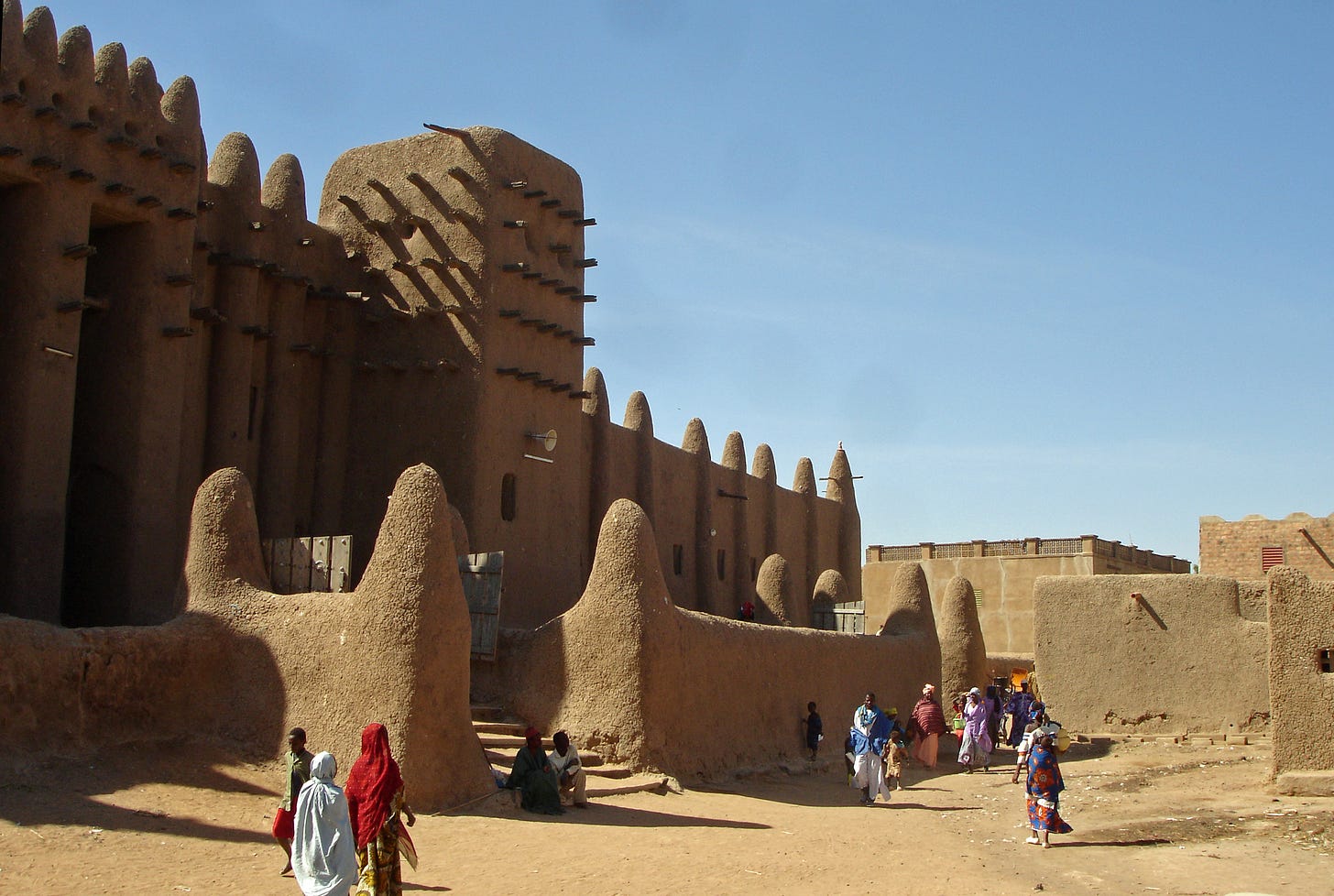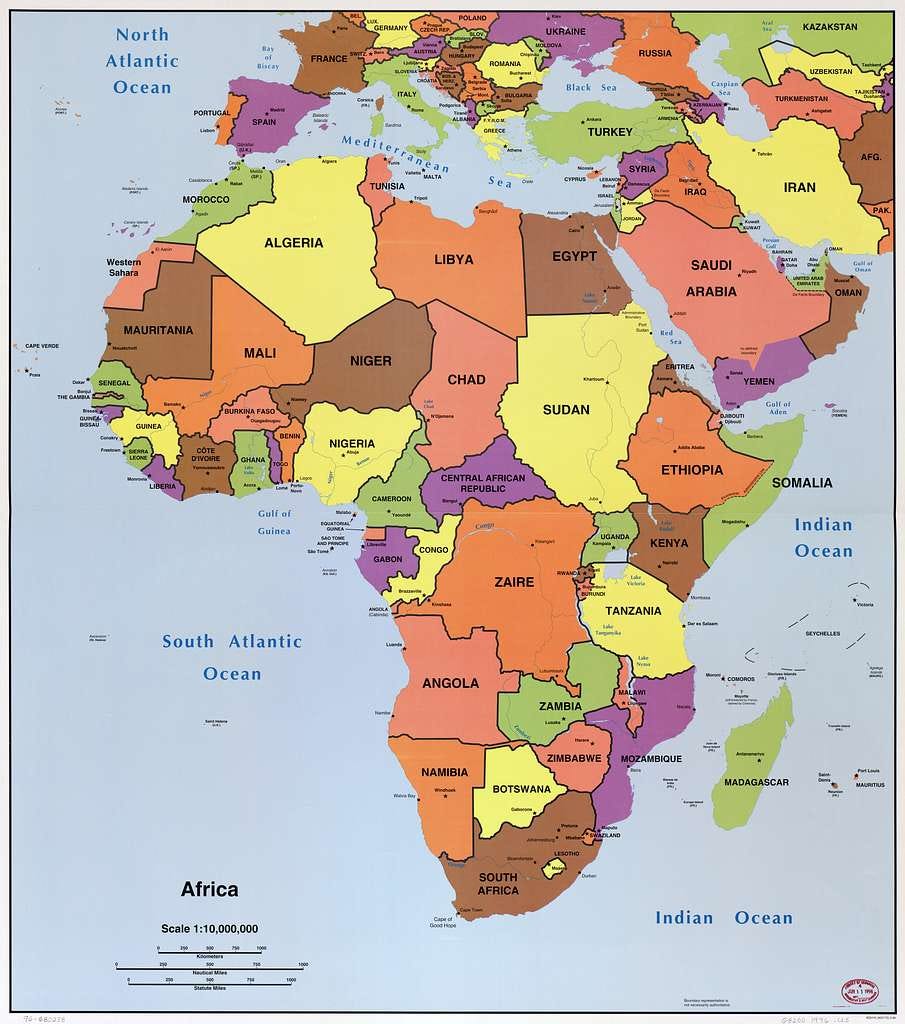The Mali Empire's Golden Age
An Exploration into the city of Gold
I wrote an article about Mansa Musa, the richest human to ever live. You should read that for some context before getting into this overview of the kingdom he presided over; The Mali Empire.
The Mali Empire, spanned the 13th to 16th centuries and was located in West Africa. Its Golden Age was marked by unparalleled prosperity, cultural advancements, and political might.
To get an idea of what this kingdom was, you can look at the map of Africa.
The Mali Empire comprised of modern-day Mali, Senegal, Gambia, and Guinea. It was an immense landmass, especially for that era. This wasn't just a result of military conquests but also strategic alliances and marriages.
The Niger River, snaking through the empire, provided a natural highway, fostering trade and communication. This geographical expanse meant a diverse range of climates, from the arid Sahara to fertile river valleys, each contributing uniquely to the empire's economy and culture.
Economic Foundations
Mali’s economy was built on Gold. The empire's southern regions, particularly Bambuk and Bure, were gold-rich with the most productive mines in the world. Miners used traditional methods to extract the precious mineral, which was then moulded into nuggets and traded. However, gold wasn't the only commodity of this empire.
The northern regions, being part of the Sahara, had vast salt mines. Salt, essential for preserving food and maintaining health in tropical climates, was as valuable as gold. Timbuktu and other Malian cities became trading nexuses, where caravans would arrive, laden with goods from as far as the Middle East and Europe.
Cultural and Educational Renaissance
The empire's wealth attracted scholars, artists, and architects from across the Islamic world. Timbuktu, Gao, and Djenne became centers of learning. The University of Sankore, with its vast libraries, attracted students from as far as Egypt. Scholars translated Arabic texts, produced original works, and engaged in debates, making Timbuktu synonymous with intellectual rigour.
This academic fervour wasn't limited to religious studies; astronomy, mathematics, and medicine were also pursued with zeal. This push for education was something Mansa Musa played a massive role in during his rule. My article on him highlights how he prioritised this and turned Mali into the centre for learning in the world.
In many ways, Mali’s leaders were visionaries.
The founder of the empire, Sundiata Keita was also known as the "Lion King.”
He laid Mali's foundations and his epic tales, passed down as oral traditions. They spoke of his military genius, diplomacy, and efforts to consolidate diverse tribes into one cohesive empire.
Of course the Mali empire had Mansa Musa whose reign is often termed as Mali's pinnacle. Musa's pilgrimage to Mecca is legendary. His caravan, comprising thousands of attendants, scholars, and 100 camels each carrying 300 pounds of gold, left a lasting impression on every city they passed. This pilgrimage also had a diplomatic angle; forging ties with neighbouring Islamic states and showcasing Mali's grandeur.
Religious Dynamics
While the elite embraced Islam, they ensured religious tolerance. Mosques and madrasas dotted the urban landscapes, while in villages, traditional animist practices continued. This coexistence enriched Mali's cultural tapestry, with Islamic festivals being celebrated alongside traditional ones.
Military and Defense
Mali's vastness required a formidable military. The empire had a standing army, a rarity in those times. I didn’t know this and just assumed empires always had that in the way countries do today. Not so. Armies would often have to be mobilised from the populace in times of war.
In Mali, soldiers were trained rigorously, equipped with iron-tipped spears, bows, and cavalry. Fortified cities, watchtowers, and a network of spies ensured the empire's security.
The Decline
Of course, no empire is immune to challenges and Mali's vastness became its Achilles heel. Governing such diverse regions, each with its own challenges, became increasingly difficult.
Succession disputes weakened the central authority. External threats, especially from the ambitious Songhai Empire, further strained Mali's resources. By the late 16th century, the empire, stretched thin and internally weakened, began its decline.
Nothing great lasts forever, but wow this was one hell of an empire I wish I knew about growing up. I’m glad I could bring this one to you. It feels like it was the Roman or Greek empire complete with armies and fortresses but in west Africa.
PAY ATTENTION





